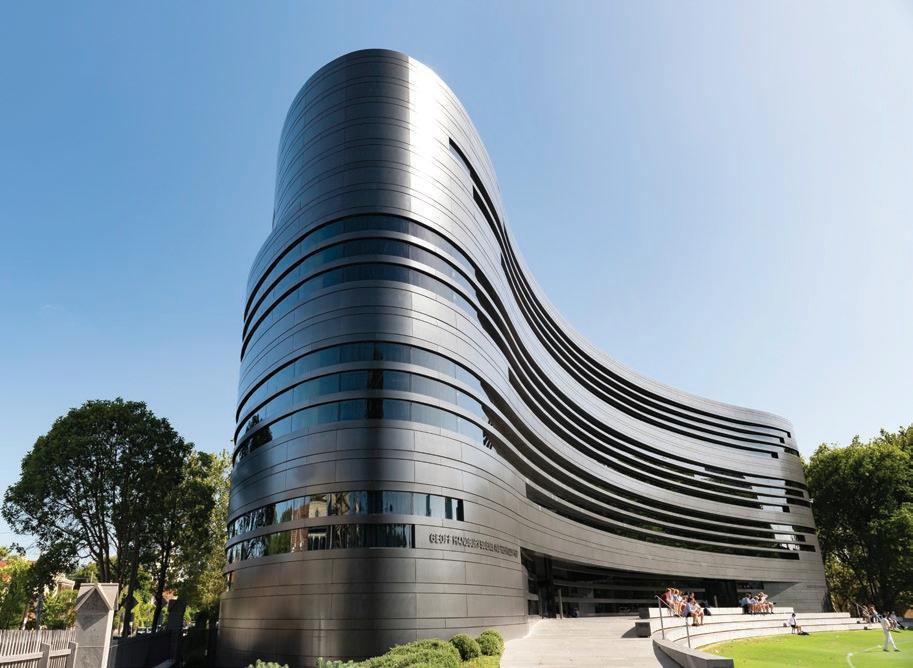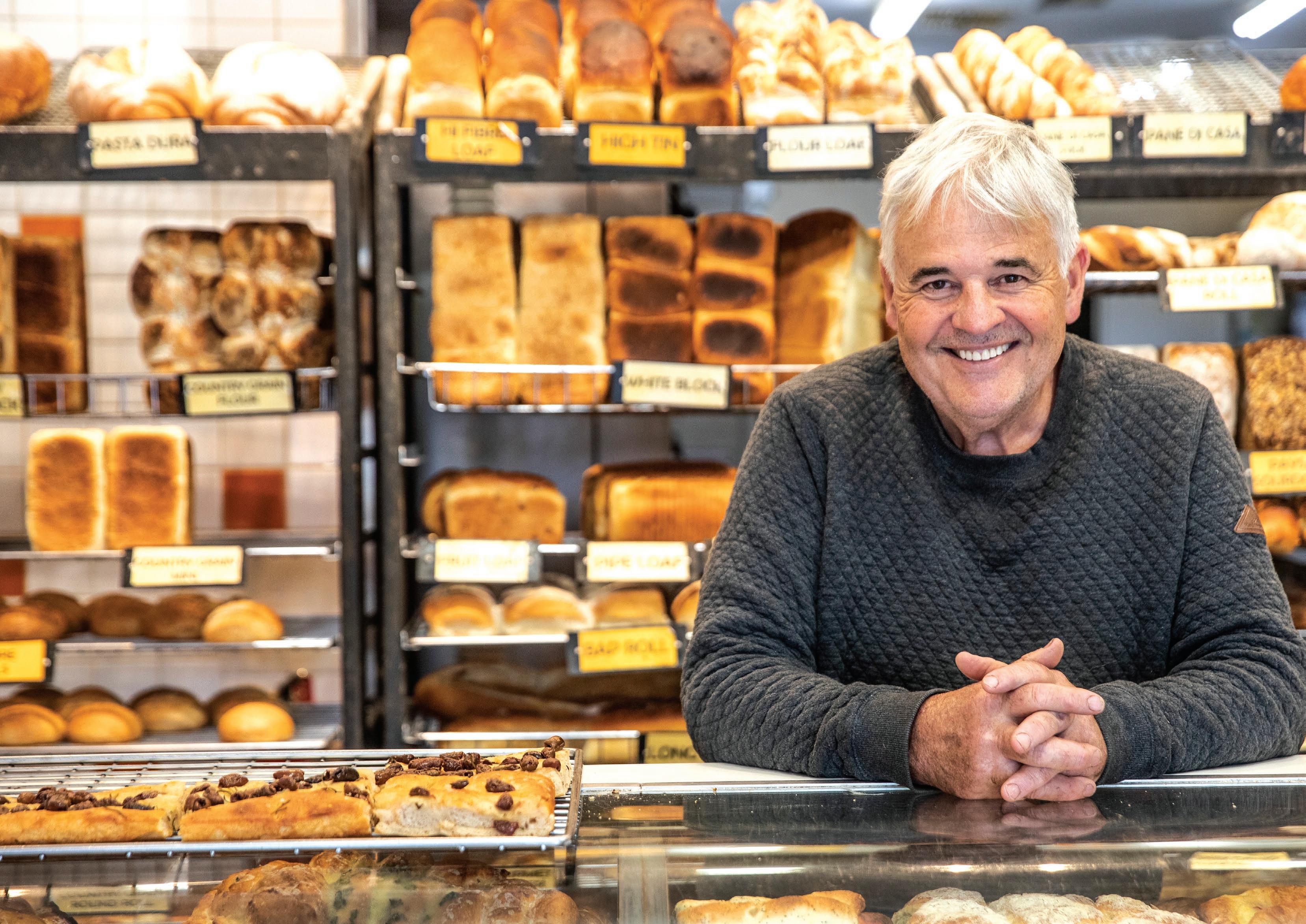
24 minute read
From the Headmaster
A baker with a sense of duty
Looking back over a lifetime defined by giving to his community, David Winter (OM 1972) sums up how he feels in one simple statement: “I’m lucky. Very, very lucky.”
David, whose contributions include everything from helping build a school in a small African community to organising the delivery of almost 10,000 meals to those in need over the course of 2020, sees his actions as part of a life that hasn’t followed a predetermined route.
“I could’ve ended up in the city with a suit and a briefcase, but early on I knew I wasn’t going to follow in my father’s footsteps,” he says. “As I’ve said to one of the Old Melburnians I mentor, mine has been the path less trodden.”
AN EARLY SENSE OF ETHICS Having started at Melbourne Grammar in late primary school, David says the lessons that had the greatest impact on him were those about how to treat other people. “If I saw someone who was in need, I stepped in. I was brought up Anglican, but those ethics are common to any person, of any belief system,” he says.
“When I was Captain of Miller House, I also came to understand the potential we had as a school to help those less fortunate than ourselves, and that’s something that still drives me today,” adds David, who was named City of Whitehorse Citizen of the Year in 2021 after he established a meals on wheels program for the elderly, people with disabilities, and international students. Delivering meals throughout Melbourne’s COVID-19 lockdowns in 2020, the program catered for over 300 people and involved over 130 local volunteers, many of whom had never participated in service before.
FOLLOWING A PASSION TO CONTRIBUTE David’s career as a baker, which began 45 years ago, has included many successes, including the creation of the Brumby’s franchise, the sale of that business, and the establishment of his current bakery, Mont Albert’s Bread Street, which has a passionate following throughout Victoria via word-of-mouth alone.
Alongside the many early mornings and hours of hard work that have gone into his career, David’s desire to contribute led to the long-term financial support of a school in Arusha, Tanzania, and to he and his wife making the decision to become foster parents. “I couldn’t have children myself, but I don’t ever look back and think ‘what if,’” he says. “A lot of my life hasn’t been planned, but all the way along I’ve been involved with young people, and that’s been extremely meaningful and rewarding to me.”
David also supports other individuals and community groups. Every day, long term employees with disabilities (including those with Down’s syndrome, autism, and limited vision) are a vital part of David’s production team. “I see ability, not disability in these people,” he says. “And other staff benefit from the experience as well.”
In addition, David supports local community groups like schools and clubs, including Rotary, by providing free product to them.
David’s connection to Melbourne Grammar continues to this day through the informal “No Reason at All” club lunch – a group of Old Melburnians from his 1971 peer group* who meet up a number of times each year simply to maintain their connections to each other. As for retirement, David admits he is looking forward to having more free time over the next few years.
“The early mornings are fine, but I still want to travel, and I’m looking forward to doing more sailing and resuming competition bridge,” he says.
I saw early on how important it was to stand up for your beliefs, and I was supported in that by my teachers.
David Winter
*David was injured during his final year of schooling and his final exams were delayed by a year. This means that David graduated in 1972 but his schooling had been undertaken with the Class of 1971.
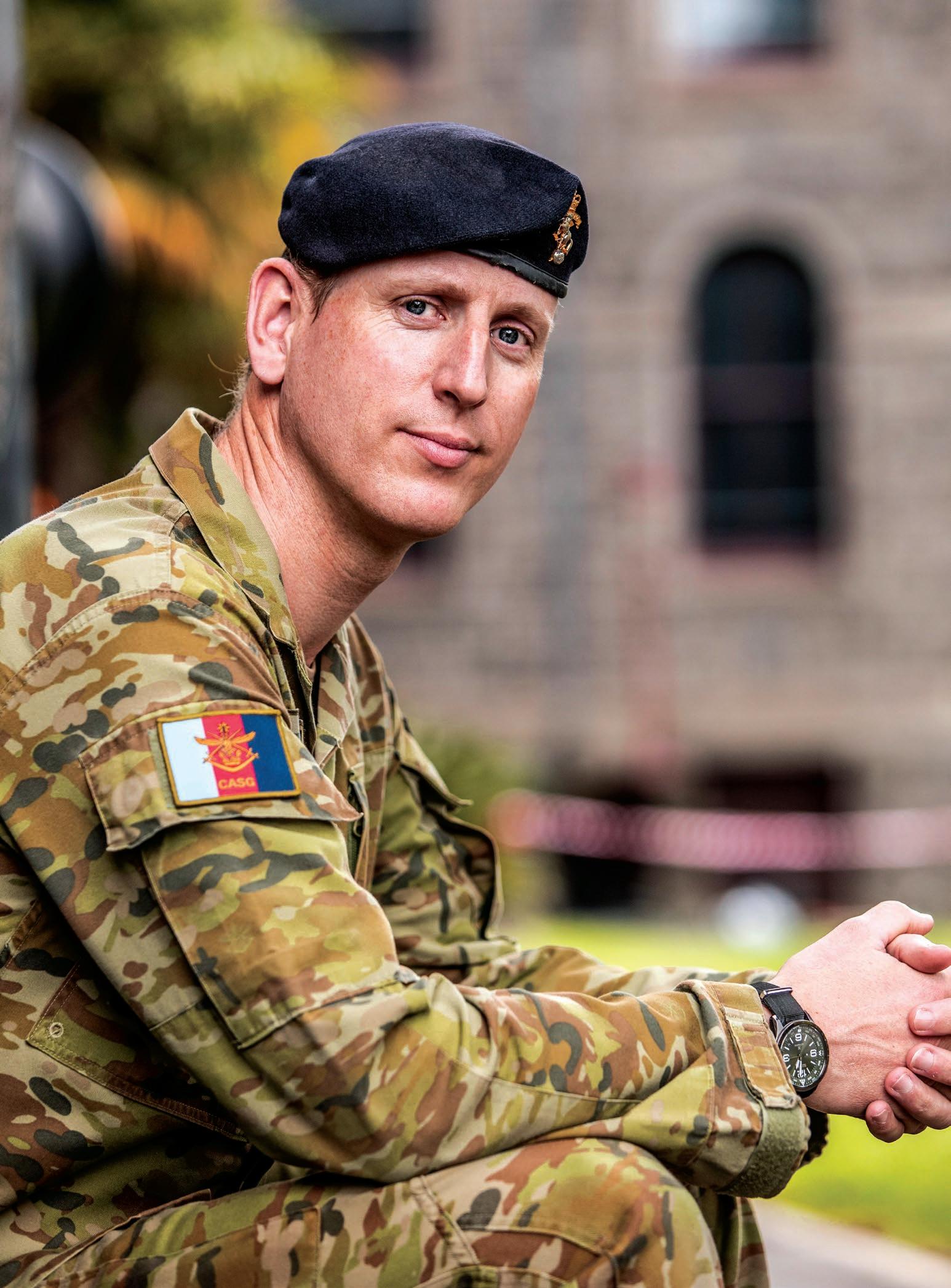
From young cadet to inspired leader
When LTCOL David Barton (OM 1997) left Melbourne Grammar with a scholarship to study at the Australian Defence Force Academy, he was already on the path he remains committed to today. Having now spent 23 years in the Australian Army, he describes this path as “more than just a job”.
“I’ll probably stay in the Army for life,” David says. “Even as a 43-year-old man, there’s a childlike enjoyment about the kind of work we get to do, and the breadth of opportunities we have is so much greater than what people realise. I’m constantly learning, and the stakes are as high as they possibly can be.”
A CAREER WITHIN A CAREER David’s primary role is to serve as a mechanical engineer, focusing on ensuring the future capability of the Army.
“Capability means more than just specifying and acquiring things like tanks and rifles,” David explains. “It also includes creating training programs, refining organisational structures, and working towards building the systems we need to defend our nation in the long term.” “Since WWI, every piece of equipment the Australian Army uses has changed – with the exception of the slouch hat,” David adds. “We need to keep pushing forward to make sure we have the technological advantage. People’s lives depend on us making the right decisions.”
While his current role involves leadership and decision-making on a large scale, David says he remains “a soldier at heart”.
“I had a boss once who flipped my view of leadership on its head,” he explains. “He told me it was my responsibility to enable the people working below me, which cascades down through the ranks. Today, I feel my main duty is to those people, and to make sure they have what they need to do their jobs.”
LEADERSHIP, DUTY AND HONOUR Having served across Australia as well as overseas in Iraq, East Timor, Afghanistan and the Solomon Islands, David says his first lessons on how to work alongside others came from experiences as a Melbourne Grammar School cadet.
“I was a shy boy at school, but being part of the cadets was where I developed my leadership skills and confidence,” he says. “Even doing things like cleaning dirty equipment taught me that you don’t ask someone to do something you wouldn’t do yourself.” “You see people’s character when you’re cold, wet, hungry and under pressure on a camp,” David adds. “I realised that my values and behaviour suited those challenges, and that the people who thrived there were compatible with me.”
David says he would encourage any young person unsure of their next step to consider going into a service-related role as a first step toward a meaningful career.
“This sort of work shows you have a willingness to give back to your community while gaining your own skills,” he says.
I see my work as part of the success of everyone who’s serving, whether it’s in conflict or in our work providing humanitarian aid and disaster relief in situations like floods, bushfires or other natural disasters. There’s a lot of pride in what we do. It’s immensely inspiring.
David Barton
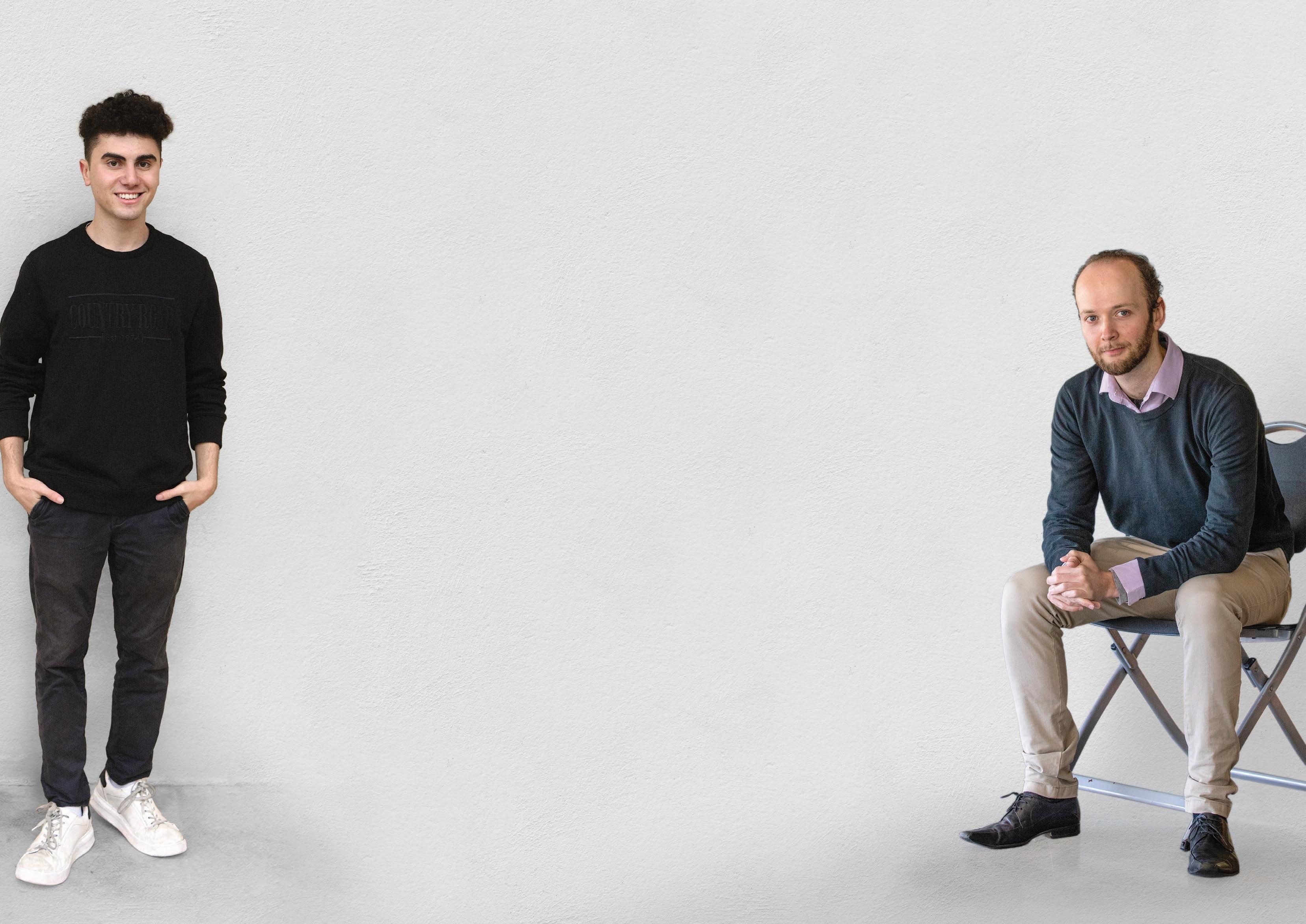
Two journeys from philosophy to profession
The professional paths of two Melbourne Grammar philosophy students — Jack Solomon (OM 2017) and Fergus Peace (OM 2011) — show just how different a career grounded in philosophy can be.
Both Jack and Fergus were Academic Heads of School (Dux) in their respective years who also earned Premier’s VCE awards for excellence in their studies.
They both went on to study Philosophy, Politics and Economics at the University of Oxford where they were both awarded the prestigious Henry Wilde Prize, which recognises Oxford’s top philosophy student in their final undergraduate year.
Since then, their paths have diverged, but as Jack and Fergus explain, their training in the philosophy classroom continues to underpin their chosen vocations.
Jack Solomon
Jack Solomon: Solving real-world problems with logic
“There’s more overlap between philosophy and app development than people think,” says Jack Solomon, who built his first app while at Wadhurst and, after completing a Master’s degree in Computer Science at Imperial College London, is now working at a tech start-up in Paris. “The formal logic that we employ in philosophical argumentation directly underpins computer circuitry. In both cases, you start off with what appears to be chaos, and you build towards something that is predictable and can be controlled.”
However, for Jack, the differences between philosophy and computer science were also important in shaping his choice of studies. “Philosophy is concerned with asking the ‘why’ questions about how the world should be. In computer science you don’t ask those questions so much,” he explains. “It’s more about taking a problem and a view of how things are, and then building a solution.”
LEARNING HOW TO ASK THE RIGHT QUESTIONS Jack says his ability to think critically and analytically was instilled early at Melbourne Grammar, in both the philosophy classroom and on debating teams — an experience that led to his being ranked fifth best high school debater in the World Schools Debating Championships, and later eighth best speaker in the European University Debating Championships. “Melbourne Grammar does a good job of letting you do the thinking,” Jack says. “The teachers value novel and creative suggestions, so you come away with the ability to question everything and think for yourself. That sets you up well for confronting problems from different angles.”
DEVELOPING A BROADER VIEW Looking towards the next step, Jack says that he hopes to use his philosophical training combined with his computer science knowledge to create something that changes people’s lives for the better.
“I want to be able to develop a piece of technology that people use and rely on every day,” he says. “Studying and working overseas has pushed that idea forward for me, because I’ve become especially aware of scale of the world.”
For now, Jack is enjoying his role in the early-stage start-up. “It’s very interesting seeing how a company is run – something I’d like to do one day,” he says. “And whatever I do, I think tech-based problem solving will be the focus.”
Fergus Peace: Analytical thinking, ethical outcomes
After studying a Master of Philosophy specialising in refugee policy, Fergus Peace says his journey has been about discovering the practical applications of philosophical thinking.
“By the end of my Masters I realised I was more interested in doing the work itself than just thinking about the theory underpinning it,” says Fergus, who is currently working as a Policy Officer at the Victorian Aboriginal Legal Service. “I felt I learned really important skills and approaches through philosophy, and I wanted to see how my intellectual efforts could make a difference to other people.” A FOCUS ON ETHICS AND JUSTICE Having worked in a number of roles with a humanitarian focus, including at the United Nations and at a think tank that aimed to create a more open migration policy for the UK, Fergus says his work has always been underpinned by the approaches he learned in the philosophy classroom.
“We’re always trying to break a problem apart and think carefully about the concepts we’re working with,” he says. “After studying ethical and political philosophy, I came to my roles in policy with that ethical lens in place. I’m always asking myself: Is this just? What would need to change about this to make it fairer?”
THE SPACE TO EXPLORE IDEAS Like Jack, Fergus built many of his argumentation skills on debating teams, and feels his Melbourne Grammar teachers were also instrumental in developing his ability to think critically about the world.
“The teachers enabled us to have discussions about the big issues, and there was time for that, rather than having to focus on what was next on the lesson plan,” he says. “They did a fantastic job of helping us not just understand philosophy as a subject, but develop a passion for it.”
As for his next step, Fergus says he will continue to pursue roles that have a focus on the ethical dimensions of philosophical thinking.
“As I get older, I’m more interested in influencing actual policy,” he says.
I want to keep working in places where there’s a desire to create public policy informed by justice, not just efficiency.
Fergus Peace
The role of the 21st century library
School libraries are fascinating places. Having worked at Melbourne Grammar’s Parncutt Library for a decade, and as a teacher-librarian for 30 years, I believe that the role of the contemporary library is to support the whole learning community, but how we do this has changed over time.
A school library should function as a place that fosters curiosity and builds capacity for learning, and this means providing more than the collection itself. I operate with the understanding that the library is a school’s ‘third space’, complementing the classroom and the playground, where students can reflect on ideas and connect with one another, and sometimes just find a place to ‘be’.
One of our roles is to offer opportunities for students to collaborate around shared interests. In the Parncutt Library – which serves our Wadhurst and Senior School students – we currently have 80 students in our Senior School book club, 15 students in our Wadhurst book club and we offer other programs such as the chess club, and workshops to help students prepare for the national history challenge. In addition, there is a changing display of student artwork on our walls, and library displays that publicise themes such as Pride Week and Reconciliation Week which help spark discussions amongst our students. We’re always open to new ways we can bring like-minded individuals together, and different approaches that will animate our libraries. All this makes a library a rich environment where people are learning in different ways.
Like the library itself, the role of teacherlibrarian is to encourage students to engage with the curriculum more deeply. These days, teacher-librarians are freed up to do more collaborative work with classroom teachers. We have the time we need to develop tools that can support student learning around particular topics, and we frequently team teach with classroom teachers to help delve into diverse materials relating to those topics and so teach the skills of information and digital literacy.
Our online Lib Guides are another example of this approach, where we bring together quality resources to help students explore a topic or idea. Rather than asking students to spend time searching for materials, we want students to spend the majority of their time on analysis, and to prompt those who want to go further to extend their understanding through self-directed research.
Above all, a contemporary school library should be a space that fosters a love of learning in anyone who spends time there. Our library welcomes everyone, catering for academically minded students and also those seeking a recreational respite from the pressures of study. It’s important to cater for all, as libraries emphasise reading for pleasure from the early years right through to senior schooling. The goal is to encourage curiosity in our young people to explore our resources in all formats and dive into research and reading without hesitation. While things may have changed in terms of the tools and resources libraries can now offer students and teachers, today, it’s still a matter of providing a warm, inviting space, along with a collection that supports both the curriculum and students’ research and recreational reading interests. The school library in the 21st century is a place for inspiration, curiosity, imagination and collaboration.
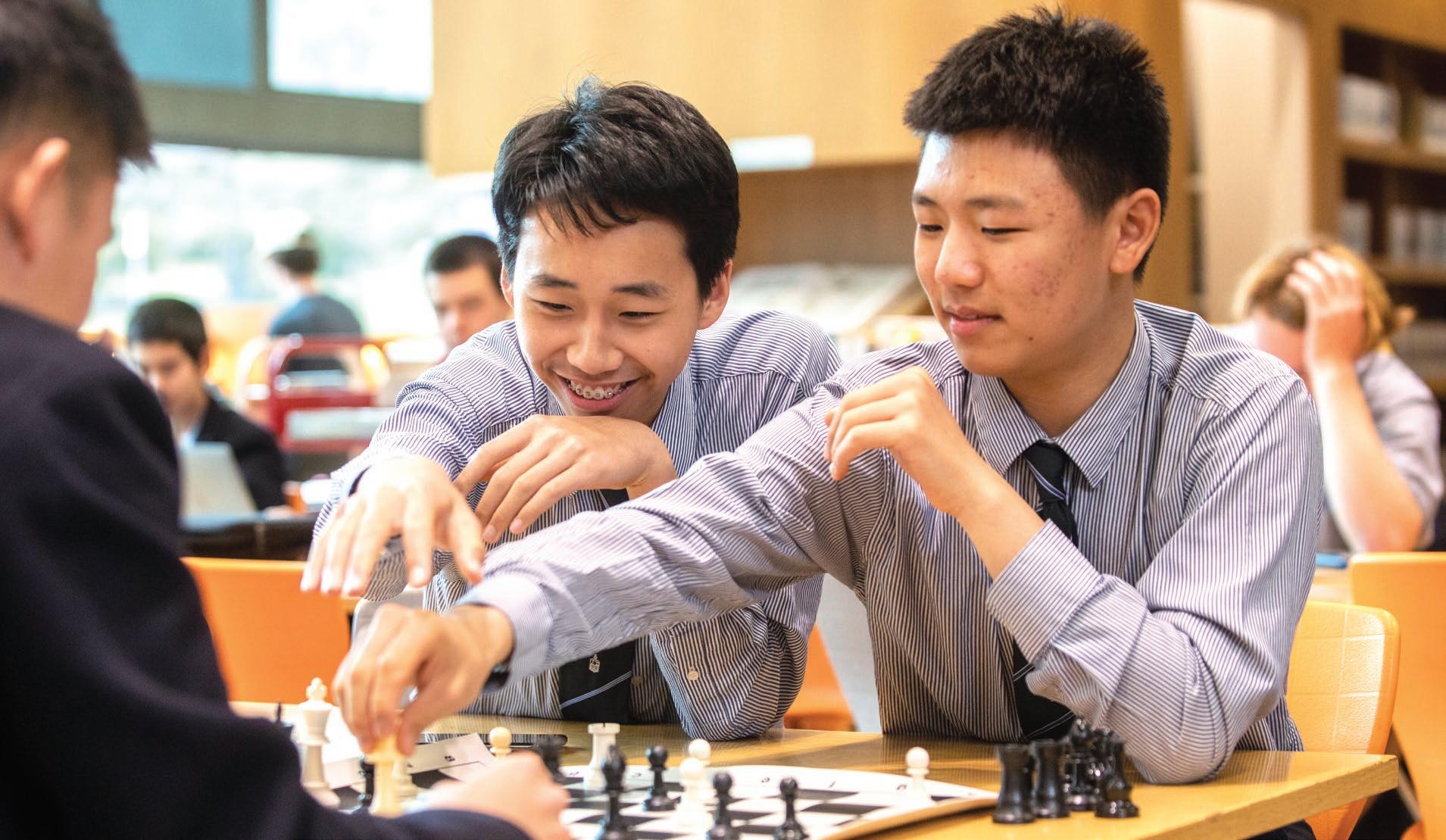
Di Ruffles Director of Library Services
About Di Ruffles
Di Ruffles holds a Bachelor of Education in Librarianship from the University of Melbourne, a postgraduate diploma in computer education, and a Master of Business in Information Technology. She is currently undertaking a PhD in Education, looking at the transformative learning opportunities of teaching transversal competencies. Di has been President of the School Library Association of Victoria since 2014.
About the Parncutt Library name
The Parncutt Library is located in the Nigel Peck Centre for Learning and Leadership (CLL) which opened in 2008. It was named the Parncutt Library in 2012 in recognition of the many contributions to the School by Bruce Parncutt AO (OM 1968).
Bruce was a member of the School Council for 10 years (1999-2009), and a member of the Foundation Board for 18 years (1992-2010), including five years as President (1992-1998). He was instrumental in setting up the Parncutt Family Scholarship which enables very able students to attend Melbourne Grammar, regardless of their financial circumstances. Bruce is also a current member of the Witherby Tower Society.
Experiencing Melbourne, then and now
How has Melbourne changed over time? What factors have influenced these changes?
Why is Melbourne considered to be one of the most liveable cities in the world?
These were just some of the questions
Year 7 students explored in a recent week-long immersion program:
The Melbourne Experience.
Working in small groups, and in collaboration with girls from Melbourne Girls Grammar (MGGS), students were challenged to respond to the questions through a specific lens like cuisine, education, sport or architecture and present their findings in a short documentary film. The resultant films were screened at an ACMI cinema at the end of the program. For Jed Athanasakos, Ziggy Murdoch and Neev Shah, who formed a group with two MGGS students, it was a “great” experience. “This is our city and, by learning about its history, it helps us understand it more,” explains Ziggy. “It is one of the most diverse cities in the world so there is a lot we can learn from it.”
THE IMPACT OF TECHNOLOGY Jed, Ziggy and Neev’s group chose to focus on the influence technology has had on three aspects of our city – health, public transport and entertainment. “We filmed one segment of our documentary outside the Royal Melbourne Hospital,” says Neev. “We talked about the technologies that help save or improve peoples’ lives.”
“The changes in public transport have made it easier for people to get around the city. They are no longer using a horse and cart, and this has impacted on liveability,” adds Jed. “We filmed this segment in a train station.” “We went to ACMI to film our segment on the change in entertainment,” explains Ziggy. “We interviewed some people there on film including a staff member who spoke about the technology they use to enhance visitor experience at their exhibitions and to make them more accessible.”
GETTING TO KNOW MELBOURNE On the first day, after participating in some ‘getting to know you’ activities, each of the 58 small groups of students headed off on a scavenger hunt across Melbourne’s CBD.
“There was a specific learning activity at each point in the hunt,” says Chris Drummond, Head of Teaching and Learning at Wadhurst, and coordinator of the program. “These were designed to encourage students to stop and take stock of their surroundings with the hope they would develop an understanding of the place they were in through a specific lens and this, in turn, might influence the direction they wished to take their inquiry. There was also a problemsolving component at each point, to assist with team building.”
Students needed to work out their own route and travel method to get to each of the 12 points under investigation. “In addition to the academic intentions underpinning the program, we wanted students to also develop a range of life skills,” explains Chris. “Becoming confident and competent independent travellers was just one of those.”
Students also participated in a film making workshop focusing on the technical and story-telling components during the week.
NEW FRIENDS, OLD FRIENDS “We were delighted to work with MGGS on this important learning program,” says Chris. “It provided an opportunity for students to build new friendships at the beginning of their secondary school journey. We hope these relationships will be long lasting and meaningful. For some Wadhurst students, it was also a chance for them to reconnect with their female friends from Grimwade House.”
The School expects that this will build the base for ongoing formal and informal engagement between these Melbourne Grammar and MGGS students throughout the remainder of their schooling days, and beyond.
And what did the students think of the program? “I liked exploring parts of Melbourne I hadn’t been to for some time, if at all,” says Ziggy. “Lockdowns prevented us from getting about too much during the past few years.”
For Neev, it was the novel approach to learning that was the most exciting part of the program. “I’d definitely want to do something like this again,” he says. “It was different to sitting in a classroom, we learnt a lot and, best of all, it was fun.”
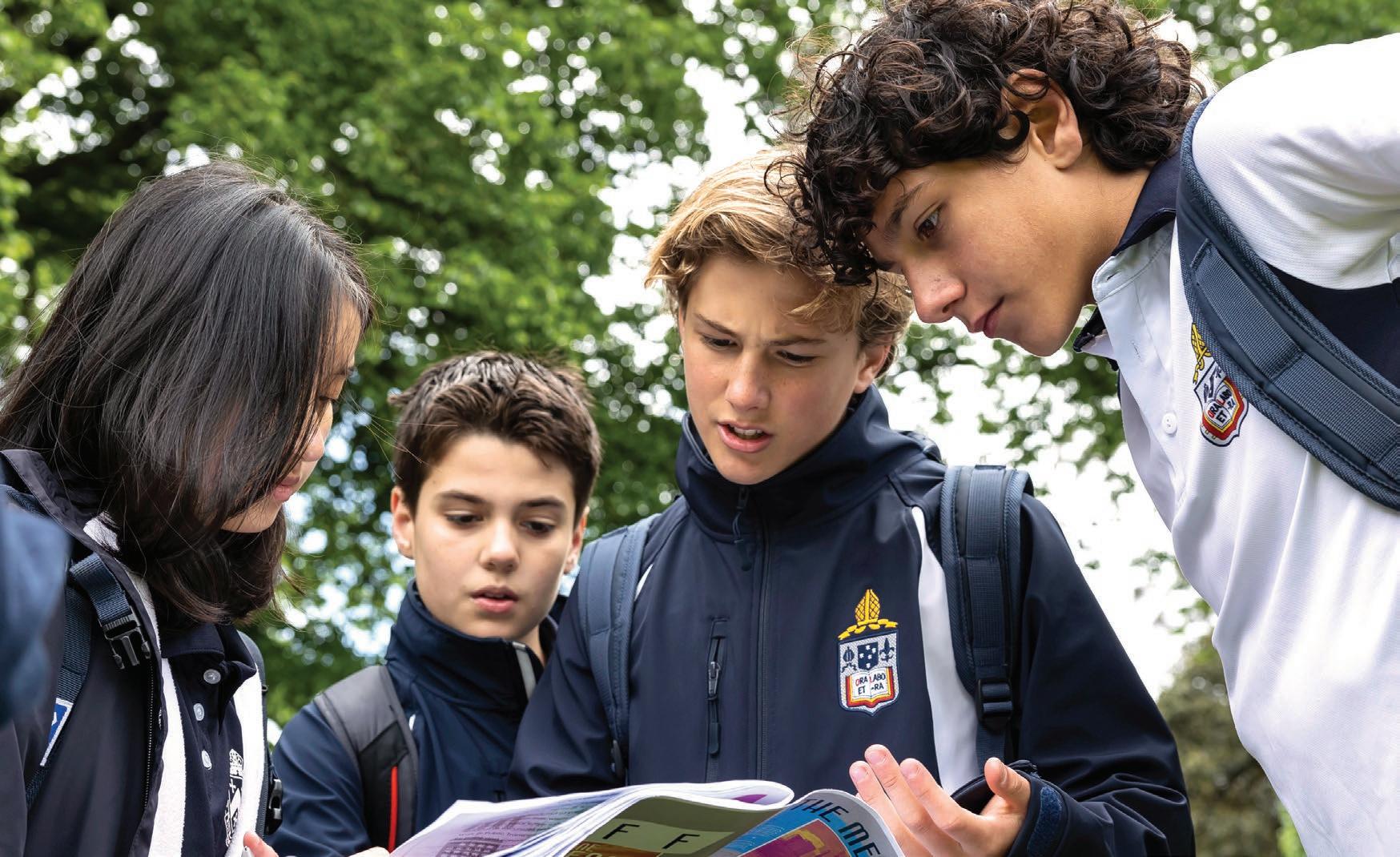
We can see a lot of Melbourne just by looking out our windows at Wadhurst. But we learnt a lot more by being there ‘in reality’.
Jed Athanasakos
The importance of purposeful play
Children love to play.
At Grimwade House, we take this enthusiasm and steer it towards academic and social learning while still maintaining the joy and excitement of investigations. We call it purposeful play.
While all play involves creativity and the development of social skills, purposeful play is different to the unstructured play that occurs in the playground. This intentional play is linked to the explicit content and skills being taught in our classrooms. Teachers purposefully provide opportunities for students to explore topics being covered in class in a more open ended – or playful – way.
We regard purposeful play as being a core element of our learning program, particularly at the Junior Primary levels (Prep to Year 2). Here, sparking the imagination of students and developing their creativity is just as important as building literacy, numeracy, and other cognitive skills.
Play provides a complex integration of various skills within a meaningful context.
BUILDING ON ENGAGEMENT AND INTEREST As part of the learning and teaching program in Junior Primary levels, each week we provide the time, environment, and materials to facilitate discovery and experimentation through activities that are linked to both core learning outcomes and children’s interests.
The first step of learning is engagement, so teachers seek to build their purposeful play framework around their students’ curiosity and interests.
As just one example, when studying the topic ‘Money’, a Year 1 class expressed interest in creating their own imaginary shoe shop. After discussing questions about the nature of a shop, types of shoes and how they are made, students set about building their own new mini-world.
Some were given a blank piece of paper and a pen, which they quickly turned into a price list. Some built the shop itself, others created the shoes, and some developed shoe seller personas. Each child engaged with the idea in the way that best suited them, while still building their academic knowledge, social skills, and having fun.
DEVELOPING SOCIAL SKILLS AND PREPAREDNESS TO TRY Whatever the scenario, students are engaged in activities during purposeful play that will build life-long social skills such as negotiation, problem-solving as a team, and self-regulating when something doesn’t go exactly the way they want it to. They also improve their ability to empathise with others and to make sensible choices and decisions. Crucially, these investigations are a way to give students permission to experiment, free from any sense that they might “fail”. When they play, there is no right or wrong. The pressure is off, and hesitation is replaced by a sense of curiosity and discovery. During the Junior Primary years students develop their attitudes to learning and schooling, so it is essential that they find their journey with us to be enjoyable, rewarding and stimulating. Purposeful play provides a balance against more structured activities, and helps link learning with positive experiences. This, in turn, promotes the mindset upon which great learners are built.
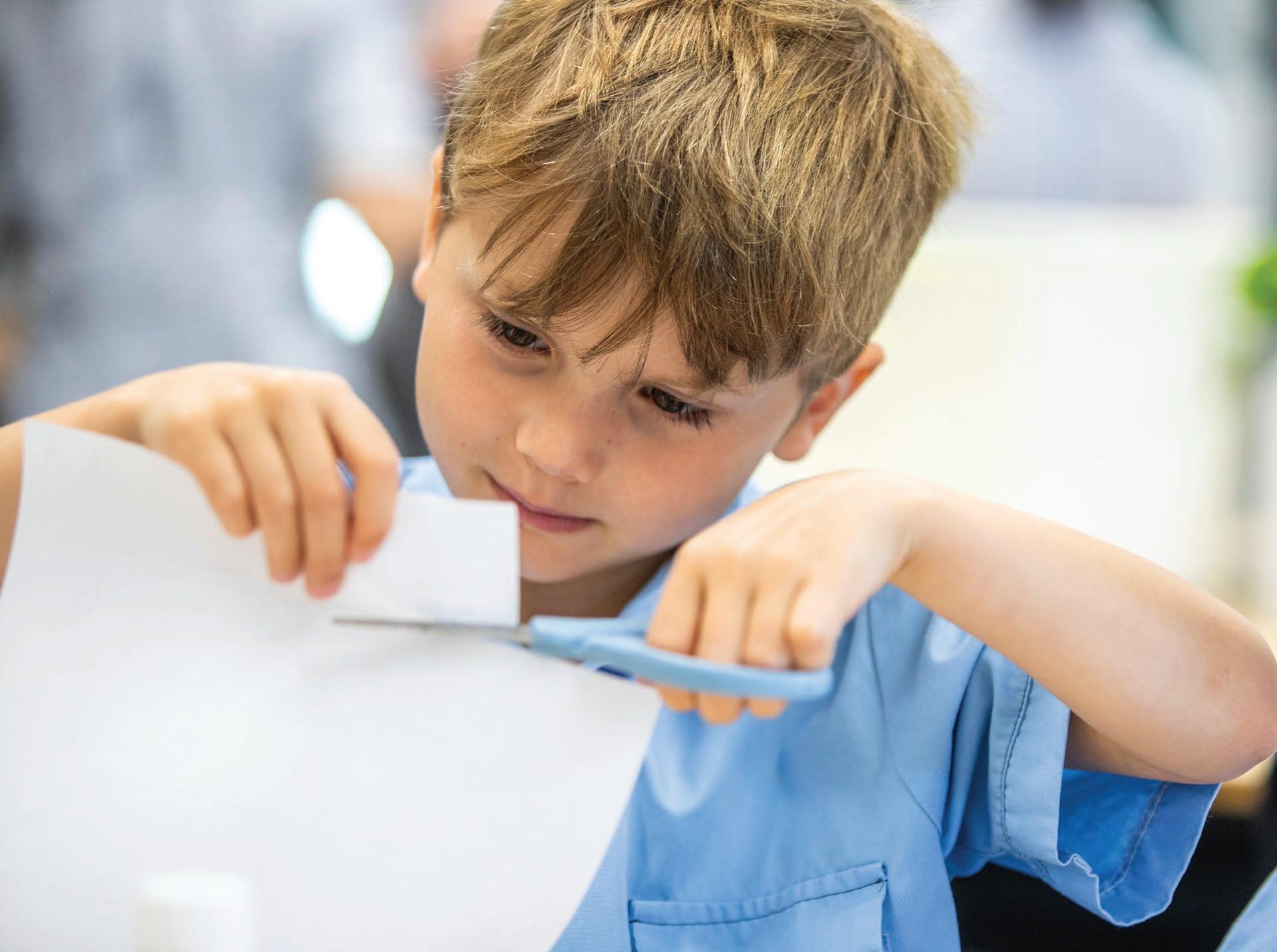
PURPOSEFUL PLAY IN THE OUTDOORS Purposeful play is not limited to the classroom environment at Grimwade House.
The myriad of sensory experiences available in the natural environment adds to children’s understanding of their immediate world and their place within it. Whether in sun, water, wind, or rain, exploring how your body moves and responds in different scenarios and how these make you feel, is vital for young children.
For example, imagine building a detailed fairy village in a garden which includes a bridge over a bubbling brook, and creating fairy characters who live and interact in the village. It seems simplistic, but if your classroom topic is ‘Fairy Tales’, the learning from this activity can be profound. In addition, young students are still learning about connection between their brain and body. Purposeful play in the outdoors also supports the interaction between physicality and intellectual growth.
Having the buildings and grounds that support all aspects of our learning program, including purposeful play, is central to our educational aims at Grimwade House. While some buildings may constrain what teachers and students can do, those that are designed with learning outcomes in mind encourage deeper engagement during both structured learning and investigations. This is why we are looking towards building a new, more flexible Junior Primary space at Grimwade House. Of course, valuing play is more than a pedagogy. It is an attitude that supports students as they grow older and begin to focus on the increasing intellectual demands of their education. By encouraging a love of play in our youngest students, we build an approach to learning that will serve them throughout their lives.
Caroline Beilby Head of Junior Primary
About Caroline Beilby
Caroline Beilby has been the Head of Junior Primary at Melbourne Grammar School since 2021.
She has extensive experience teaching and developing programs for children in years Prep to Year 2, having been a teacher within those year levels for more than 16 years.
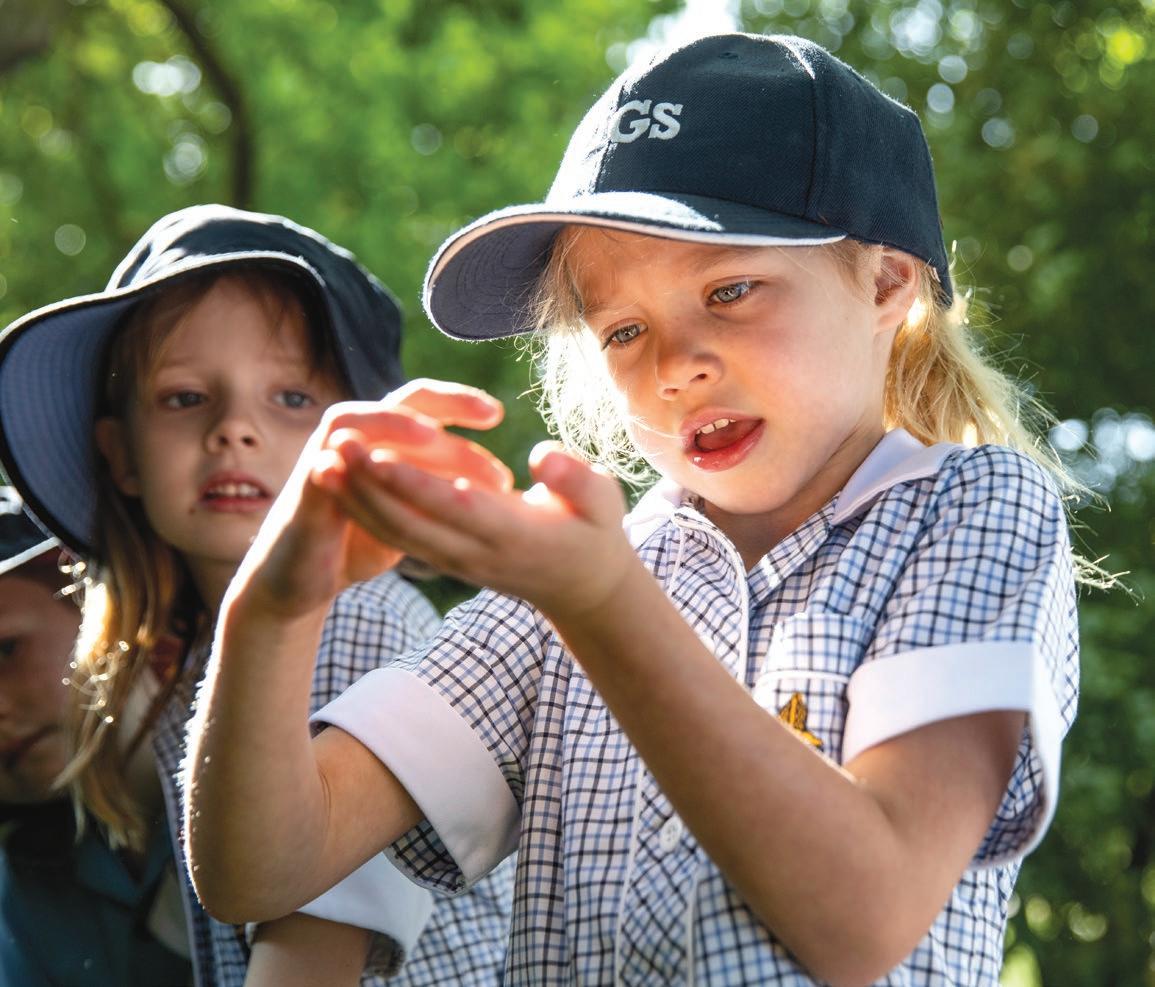
How buildings create school culture
A school building is much more than a collection of classrooms. I believe that if we take the culture and aspirations of a school into account when we design a learning space, it can become a site that tells us what matters to the entire school community.
From an Indigenous perspective, there is, of course, a synergistic relationship between people and land. Our First Nations peoples see themselves as the carers and custodians of the places they inhabit, and understand that if they care for the land, the land cares for them.
We can think about these ideas in the context of our School, our buildings, and our built environments. We can begin to consider that a building sends messages about how we contribute, how we engage with one another, and how we can do that with a sense of care.
Melbourne Grammar’s newest building, the Geoff Handbury Science and Technology Hub, is one example of a space that tells an important story to the people who work and study there. This building was in its planning stages when I joined the School, and I was glad to be able to contribute to some of the decisions that went into making it the inspiring learning space it is today. Some of these decisions may seem superficial at first, but they all go toward creating an environment where learning and teaching are truly supported. For example, the right temperature and lighting mean students and teachers are immediately comfortable. Taking the time to test the acoustics of a room, and the level of noise that leaks between classrooms, also makes an important difference to concentration and focus. Even our choice of colour palette, and the way we design the flow of movement between classrooms, can mean students arrive at their next class calm and ready to learn.
I see a considered building as one that supports the relationships between the people in it. When we look at a learning space we can ask: Does this place reinforce a sense of being part of a greater whole? Are there spaces that allow people to gather and connect with others, including those who are not part of their immediate group or year level?
About Andrew Baylis
Andrew Baylis (OM 1979) has held the position of Melbourne Grammar School’s Director of Learning and Research since 2014. Prior to this, his appointments included Executive Director of the Crowther Centre, Director of Teaching and Learning at Brighton Grammar School, and Head of Physics at both Henry Box School in the UK and St Bernard’s College. In all these ways, a building communicates the culture of the people who built it. Most recently, our School has been designed around a cultural message of openness, with decisions made to ensure we can see the wider world beyond our gates. Through decisions like these, we reinforce a culture that is not walled off from the real world, but connected to it as its custodians and carers.
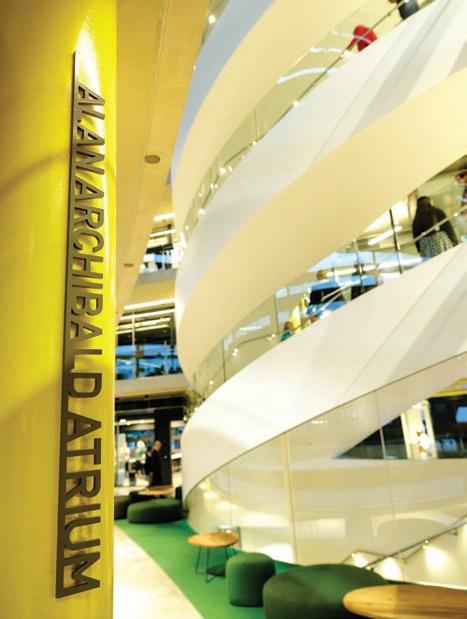
Andrew Baylis Director of Learning and Research
